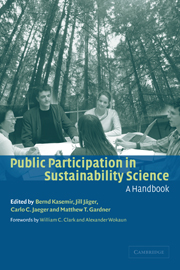Book contents
- Frontmatter
- Contents
- Notes on contributors
- Foreword: science, participation, and sustainability
- Foreword: sustainability, energy use, and public participation
- Preface
- Acknowledgments
- Part I Concepts and insights
- Part II Experiences with IA Focus Groups
- Introduction
- 4 Collage processes and citizens' visions for the future
- 5 Citizen interaction with computer models
- 6 Citizens' reports on climate strategies
- Part III Further forms of participation
- Part IV Future perspectives
- References
- Index
4 - Collage processes and citizens' visions for the future
Published online by Cambridge University Press: 22 September 2009
- Frontmatter
- Contents
- Notes on contributors
- Foreword: science, participation, and sustainability
- Foreword: sustainability, energy use, and public participation
- Preface
- Acknowledgments
- Part I Concepts and insights
- Part II Experiences with IA Focus Groups
- Introduction
- 4 Collage processes and citizens' visions for the future
- 5 Citizen interaction with computer models
- 6 Citizens' reports on climate strategies
- Part III Further forms of participation
- Part IV Future perspectives
- References
- Index
Summary
Introduction
In order to respond effectively to the challenge of preparing a sustainability transition, major changes in the socio-economic system of modern society will have to be envisaged. Some earlier and simpler environmental problems could be tackled, for example, by reducing toxic by-products of a few production processes. However, responses to prospects of, for example, climate change will require large shifts right at the heart of our industrialized cultures, especially in the manner in which we use energy and produce greenhouse gases in the process. Referring to reduction scenarios discussed in the context of the Intergovernmental Panel on Climate Change (IPCC), Kempton (1991) has stressed that “if world leaders decide to reduce greenhouse gas emissions by two-thirds, such a large reduction will require consumer and worker co-operation as well as citizen consent that major societal changes are worth the effort.” Responses to global environmental change will only be effective if they have clear public support.
Understanding the reactions of citizens to prospects of climate change and related policy options is thus a central element in developing effective climate policies. Studies on this issue can build upon a large body of research on environmental consciousness and behavior in general (see, e.g., the comprehensive overview by Brand 1997). In the last few decades, a variety of studies have focused specifically on perceptions of climate change issues (see, e.g., the overview by Jaeger et al. 1993; and by Thompson and Rayner 1998).
- Type
- Chapter
- Information
- Public Participation in Sustainability ScienceA Handbook, pp. 81 - 104Publisher: Cambridge University PressPrint publication year: 2003
- 7
- Cited by



